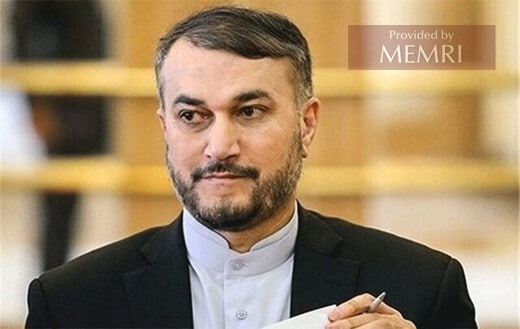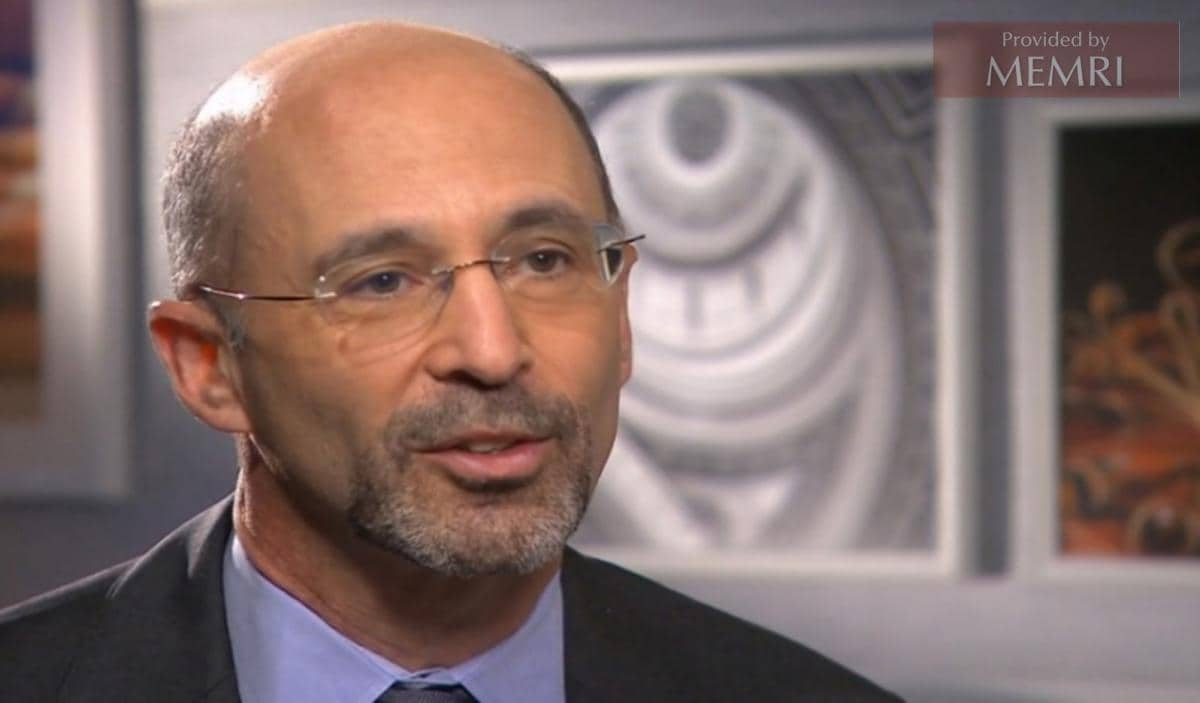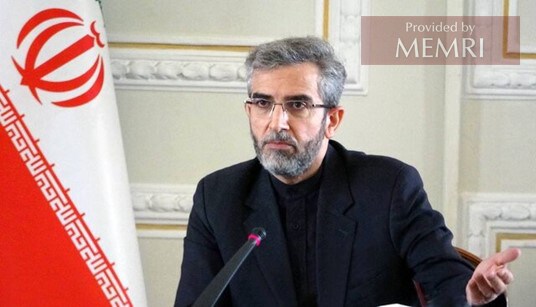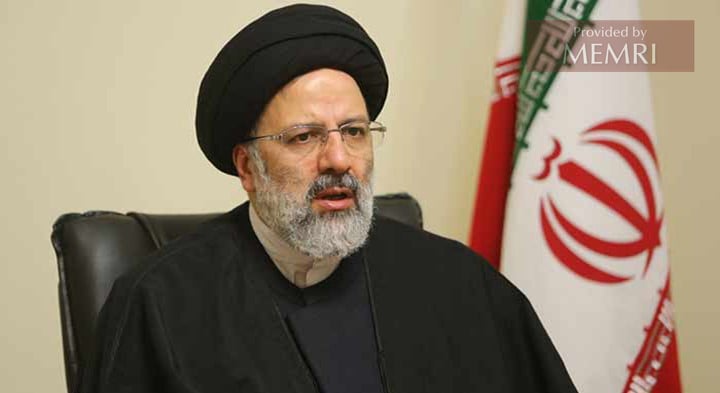Introduction
Following the renewal of the seventh round of nuclear talks in Vienna, it is becoming more and more clear that all the sides involved are living in a fantasy and that their delusions are gradually being exposed. All the sides are realizing that their hopes and expectations are indeed delusions, and their declarations in recent days attest to the fact that their positions are cut off from reality.
The following is an examination of both sides' positions.
The American/European Side
The American/European Side Does Not Understand That There Is No Way Back To The 2015 JCPOA Agreement – It Has Been Stripped Of Content By Iran And Exists As A Mere Empty Framework
Although all that remains of the JCPOA is its formal framework, and it has been completely emptied of content by Iran through the latter's violation of all of its aspects, the American/European side is acting as if Iran's nuclear program can be brought back under the restrictions of the 2015 JCPOA.[1] According to a November 17, 2021 International Atomic Energy Agency (IAEA) report,[2] Iran is enriching uranium far beyond the 3.67% permitted in the JCPOA, to 60%. Its inventory of uranium exceeds the permitted 300 kg, with 2,489 kg of uranium enriched to a range of levels: 113.8 kg at 20%, 17.7 kg at 60%, 1,622 kg at 2%-5%, and 59 kg at 2%. It is using IR-4- and IR-6-generation centrifuge cascades, much more advanced than the first generation that it is allowed to use; and it is not cooperating with the IAEA, in violation of its commitment to do so. It is also not allowing inspections of its declared nuclear sites and refuses to allow inspections or even to answer questions about its undeclared nuclear sites that have been exposed. Additionally, it is not cooperating with the IAEA in the matter of its plutonium reactor at Arak.
It should be emphasized that no declaration by senior Iranian officials has expressed an Iranian commitment to return to the original 2015 JCPOA even if the U.S. lifts all the sanctions.
The U.S. Administration Has Come To Terms With Iran's Extortion Of Funds As A Condition For Contacts With It
About a month before the negotiations began, Iranian Foreign Minister Hossein Abdollahian demanded that the Biden administration release at least $10 billion of frozen Iranian funds to prove the seriousness of its intentions.[3]

Iranian Foreign Minister Abdollahian (Source: ISNA, Iran, December 14, 2021)
The U.S. administration released $3.5 billion to the Iranian regime as a gesture of goodwill, in the hope that it would be received as a sign of its serious intentions.[4] Additionally, several days before the talks began, the administration extended the waiver on sanctions for Iraq regarding Iranian oil – a path that allows Iran to sell oil via Iraq – which was also received in the West as an American gesture to the Iranian regime.[5]
The regime mouthpiece, the Kayhan daily, tried to clarify that this was not a precondition, but that "from now on, the payment that must be paid by the American side is $10 billion for its meeting" with the Iranian side, "and this is in order to test the sincerity of their intentions."[6]
Even After Years Of Negotiations, The U.S. Administration Does Not Understand The Fundamental Political Culture And Ideology Of The Iranian Regime In Its Attitude Towards The U.S.: America Is "The Great Satan"; Iran Does Not Recognize It And Is Unwilling To Maintain A Public Relationship With It, And Will Not Accept A U.S. Return To Negotiations Before It Is Punished
The U.S. has been forced to agree to a preliminary discussion about the conditions for its reacceptance to the negotiations and to the JCPOA. On December 12, 2021, Iranian Deputy Foreign Minister Ali Bagheri Kani, who also heads the Iranian negotiating team, clarified: "One of the central issues in this [round of] negotiations [in Vienna] is to determine the conditions required for the [return of] America to the agreement from which it withdrew and which it now seeks to rejoin. Accordingly, we cannot ignore this agreement [the JCPOA on which Iran says it has based the demands that it has submitted] and I think that our view was not and is not maximal at all."[7]
Furthermore, the Biden administration saw Iran's insistence on excluding the U.S. from the negotiating room as a meaningless whim, thinking that the real issues will be determined in the negotiations themselves. U.S. State Department Special Envoy for Iran Robert Malley even reiterated, in a December 9, 2021 Al-Jazeera interview, the American administration's proposal to Iran to hold direct negotiations "at any time and any place," saying: "We're prepared to meet with them face-to-face. We think it's far superior to indirect negotiations."[8]

Special Envoy Robert Malley (Source: Al-Jazeera, Qatar, December 9, 2021)
In his statements, Malley revealed the U.S. administration's grave misunderstanding of how Iran perceives the U.S. position. "The Great Satan" is not a propaganda slogan, but a fundamental stance and an ideological foundation vis-à-vis the U.S., as expressed by the refusal of the government of Iranian President Ebrahim Raisi, like that of his predecessor Hassan Rohani, to conduct any public relationship with the U.S. One example from the past few days of this Iranian regime approach to the U.S. can be found in November 27, 2021 statements by Iranian Armed Forces spokesman Abdolfazl Shekarchi: "The Imam [Ayatollah Ruhollah Khomeini] did well to call America 'the Great Satan.' 'The Great Satan' is one thing, and there are also smaller Satans, such as England and France... Every so often they, with their satanic nature, lead America itself to perdition. In many cases, England has been the basis for America's fall, because the American officials are extremely stupid. The Satans in England... are birds of prey... [But] there is no difference between England, France, and America."[9]
It is now becoming clear to the Americans that the Iranians' exclusion of them in the negotiations is an essential matter of principle demonstrating that the U.S. is to blame for the situation, and that therefore it must take the first step – the lifting of all sanctions and Iranian verification of this on the ground, a process that takes time. Only afterwards will the Iranians make any move at all.
The U.S. Does Not Understand That Iran Will Not Compromise On Its Positions
With the renewal of the second stage of the seventh round of talks, on December 7, 2021, it is now clear to the Americans that the Iranian regime is considering its position paper, which it submitted, as a final position that must be accepted, and that this position must be the final outcome of the negotiations. The Americans also thought that the seventh round of talks would begin at the same point as the sixth round ended, and that there would be no backtracking from what was concluded by the two sides in the six previous rounds. They are now realizing that the Iranian side is rejecting those conclusions and is beginning from a different point, arguing that its position paper is based on the 2015 JCPOA and therefore must be accepted in full.
Iran's representative in the IAEA, Mohammad Reza Ghaibi, at a November 25, 2021 IAEA Board of Governors meeting, explained the Iranian regime's position, according to which "Iran believes that the negotiations must be results-directed. It is, therefore, important that the outcome of these efforts will ensure that all sanctions will be lifted effectively and that this can be verified [by Iran]."[10]
The American/European side had hoped that after the first round of negotiations with the Raisi government, the Iranians would more or less give up on their maximal demands as submitted in writing at the beginning of the seventh round of talks, and would present realistic positions for the opening of "serious" negotiations. But at a December 7, 2021 White House briefing, U.S. National Security Advisor Jake Sullivan expressed his frustration at Iran's uncompromising position: "The more Iran demonstrates a lack of seriousness at the negotiating table, the more unity there is among the P5+1 and the more they will be exposed as the isolated party in this negotiation. So really, the ball is in Iran’s court as to whether it wants to show up and demonstrate that it’s going to be serious or not."[11]
The Biden administration does not realize that its positive positions vis-à-vis Iran are completely unappreciated by the Iranian leadership – instead, they are perceived as weakness and as a basis for additional extortion.
In light of Iran's rigidity, the Americans are now compelled to threaten with alternatives, even though they stress that their first preference is negotiations, and are examining cooperation with other countries – the three European countries in the negotiations, Britain, France, and Germany, and also with Israel.
The U.S. Does Not Understand Iran's Refusal To Negotiate On Other Strategic Issues
The American position included a demand to discuss Iran's ballistic missiles with a range of over 2,000 km, assuming that the Iranians realize that this must be part of the negotiations. But the Americans are now realizing that Iran's refusal to discuss this issue is a matter of principle and that Iran will not back down on it.
The Iranian Side
Iran Does Not Understand That Its Positions Are Unrealistic And That The West Cannot Accept Them – And Thinks That It Can Force Them On The West
The new Iranian government, headed by President Ebrahim Raisi, believes that if it insists on its position that it will be able to force the West to lift all the American sanctions and that it will verify that this has been done before it makes any move whatsoever. It must be emphasized that Iran's demand for all the sanctions to be lifted is in fact an expansion of the JCPOA framework; in the JCPOA it was concluded that only the nuclear sanctions would be lifted and that all the other sanctions on Iran, imposed by Congress for its violation of human rights and promotion of terrorism, would remain in place. This is because Iran refused to include these issues in the negotiations it conducted with the Obama administration, along with the issues of limits on the range of its ballistic missiles and its expansion in the region.
The Iranian regime thinks that its argument that Iran has met its obligations under the JCPOA will continue to be accepted, even though Iran has stripped all significance from the JCPOA, beginning in October 2019, in an orderly and proactive move. According to Iran's position, the U.S. was the party that failed to meet its obligations, and therefore it is obliged to back down and make the first moves – that is, lift all the sanctions, have Iran verify that they have been lifted, and pay compensation to Iran for the suffering caused by President Donald Trump's decision to withdraw from the JCPOA.
Statements by Ali Bagheri-Kani, Iranian Deputy Foreign Minister and negotiating team head for the Vienna talks, demonstrate this position. He said on December 9, 2021: "[The solution] to these disputes over [the lifting of] the sanctions [depends on] serious intent and practical willingness on their part [i.e. the U.S.]. When this serious intent is actualized, we will be able to take steps to lift the sanctions. The lifting of the sanctions creates a serious opening for advancing the talks, particularly with regard to [Iran's] nuclear operation [regarding a return to its commitments]."[12]

Deputy Foreign Minister Bagheri-Kani (Source: Tasnim, Iran, December 7, 2021)
Iranian Foreign Minister Abdollahian wrote in an article published on December 7, 2021 by the Russian newspaper Kommersant: "During the previous six rounds of talks, it became abundantly clear to the Iranian side that America is not paying attention to the fact that there is no way to revive the JCPOA without lifting all the illegal sanctions... I want to stress that the current window of talks will not remain open forever. America and the three European countries must understand this very well."[13]
The Iranians believe that they are proving their seriousness in the negotiations by adhering to procedural matters: their arrival at the talks, their remaining in Vienna even when the other side departs for consultations, and, primarily, the submission of the position paper whose comprehensive demands they expect to be fully met due to this ostensible "seriousness." They also announced that they are about to submit an additional document regarding the compensation that the U.S. must pay to Iran for the damage done to it.
President Ebrahim Raisi said at a December 11, 2021 conference for Iran's ambassadors to neighboring countries: "The presentation of the text of Iran's proposal at the negotiations proves to the sides in the negotiations that we are in serious negotiations and that if the other side is determined to lift the sanctions, the way to arrive at an agreement is smooth."[14]

President Raisi (Source: Irdiplomacy.ir, April 16, 2017)
Iranian Interior Minister Ahmad Vahidi said on the eve of the talks' renewal, on December 6, 2021: "The Raisi government has announced its intention to negotiate by giving two plans to the Europeans. The ball is in Europe's court, and the outcome must be the complete lifting of the sanctions, and this is the serious demand of the [Raisi] government. The Western sides have returned to their countries [for consultation]. Our demand is clear, and the European countries must compensate [Iran] for their inaction in light of their violation of the [JCPOA] agreement. We must examine how serious they are regarding their commitment, and we are willing to work with them if [they lift the sanctions]. Their commitment must be to lift all the sanctions."[15] However, it is now becoming clear to the Iranians that neither the U.S. nor Europe are willing to consider their position, even as an opening position.
The Iranian Regime Does Not Understand The Biden Administration's Positive Intentions
The Iranian desire for the Iranian regime to publicly humiliate the U.S. is preventing the regime from understanding that the Biden administration is trying any way it can, with genuine goodwill, to arrive at an understanding with it by maintaining the JCPOA in a way that will serve Iran's interests.
The Iranian Regime Is Mistaken In Its Delusions About Its Military Power vs. The U.S.
The Iranian side is deluding itself that it is capable of deterring the U.S. with threats and military operations. Furthermore, the Iranian side truly believes that the U.S. has been deteriorating since the 1979 Islamic Revolution, and that its retreat from Afghanistan is an additional manifestation of its weakness.[16] Recently, the Iranian regime staged an incident that it claimed had taken place in the Persian Gulf between forces of Iran's Islamic Revolutionary Guard Corps (IRGC) and the U.S. Navy, simulating a U.S. attempt to capture an Iranian oil tanker that was foiled by the IRGC. A four-minute video montage was released depicting the alleged clash; the video included narration and commentary by Iranian strategist Hassan Abbasi, claiming that America has been "dead" since the 1979 hostage crisis. It is superfluous to note that the Pentagon denied that such an incident had taken place.
To view the December 2, 2021 video of an alleged attack and Hassan Abbasi's commentary on MEMRI TV, click here or below:
It should also be noted that according to the Iranian regime, it dealt a successful blow against the U.S. Army in response to the assassination of IRGC Qods Force commander Qassem Soleimani, who led Iran's expansion in the region, with missiles fired at the Ain Al-Assad base in Iraq. This is despite the fact that the attack had been coordinated in advance with the Americans so that there would be no loss of American lives. See MEMRI Inquiry and Analysis report The Iran-U.S. Crisis, Part III: Iran's January 2020 Strikes On U.S. Ayn Al-Asad Airbase – The Roars Of A Fearful Paper Tiger, November 10, 2021.
Assessment
It appears that in light of the profound discrepancies between the sides' positions, and the Iranian regime's unwillingness to negotiate directly with the U.S., Iran will continue to demand that the U.S. pay it for continued contact with it in the coming rounds of talks, in order to shore up its shaky economy. At the same time, it is continuing to threaten the U.S. and demand that all the American sanctions be lifted, including those put in place by Congress that the Biden administration is not authorized or able to lift.
It should be noted that the only restriction stressed by the Biden administration concerning Iran is Iran's obligation never to gain nuclear weapons. Such a demand is ostensibly compatible with the Iranian regime's proud promotion of Iranian Supreme Leader Ali Khamenei's alleged fatwa banning nuclear weapons.[17]
Based on the assumption that the Iranian regime is truly not interested in nuclear weapons, the sides should have found a common basis for future understandings. The not-insurmountable distance between these two positions should have led the sides to a common ground for understandings and agreement. But the fact is that neither side is even capable of conducting honest negotiations. This is for two reasons:
-
The assumption that Iran does not seek nuclear weapons is wrong.
-
The Iranian regime's institutional ideological hostility towards the U.S., which it views as the leader of the world order that must step down from its role, does not allow its leaders to arrive at any agreement with the U.S. in which the latter does not fully surrender to the demands of the Iranian regime.
* A. Savyon is director of the MEMRI Iran Media Project; Y. Carmon is President of MEMRI.
[1] See MEMRI Inquiry and Analysis reports No. 1478, Despite The JCPOA, Iran Accelerates Its Nuclear Research And Development – While The U.S., After Leaving The JCPOA, In Fact Preserves It With Waivers For Member Countries Allowing Them To Help Iran Continue Civilian Nuclear Development, October 10, 2019; No. 1481, Even As UK, France Acknowledge That Iran Is Violating The JCPOA, The Trump Administration, After Ostensibly Withdrawing From It, Continues To Preserve It – By Means Of Its Waivers For Civilian Nuclear Cooperation With Iran, November 6, 2019.
[2] Iaea.org/sites/default/files/21/11/gov2021-51.pdf, November 17, 2021.
[3] Abdollahian said on Iranian TV on October 3, 2021: "Biden wants to get to the negotiating table... Therefore, we have told the other sides that our intentions are serious. We are people who negotiate, and we are people of action. You must know that the new Iranian government is one of action. Our people will not benefit from negotiations that will result in drinking coffee. Our people will benefit from negotiations in which all its economic interests are actualized in the framework of the nuclear agreement. [If] Biden's intent is serious, he must demonstrate this, and serious intention means the release of at least $10 billion of [the Iranian regime's] funds [that have been blocked in other countries]." Hamshahrionline.ir, October 3, 2021.
[4] Iranian Foreign Ministry spokesman Saeed Khatibzadeh confirmed, on November 15, 2021, that $3.5 billion of Iran's blocked funds had been released, and added that "Iran is acting for the release of more of its funds." ISNA, Iran, November 15, 2021.
[5] Freebeacon.com/biden-administration/biden-admin-ignores-congressional-inquiries-into-iran-sanctions-relief. November 29, 2021.
[6] Kayhan (Iran), October 12, 2021.
[7] ISNA (Iran), December 12, 2021.
[8] Aljazeera.com/news/2021/12/9/us-privileging-path-of-diplomacy-with-iran-biden-envoy-says, December 9, 2021.
[9] ISNA (Iran), November 28, 2021.
[10] Tasnimnews.ir, November 25, 2021.
[11] Whitehouse.gov/briefing-room/press-briefings/2021/12/07/press-briefing-by-press-secretary-jen-psaki-and-national-security-advisor-jake-sullivan-december-7-2021.
[12] ISNA (Iran), December 9, 2021.
[13] Tasnimnews.ir, December 7, 2021.
[14] President.ir/fa/133255, December 11, 2021.
[15] Tasnimnews.ir, December 6, 2021..
[16] See for example November 27, 2021 statements by Iranian Armed Forces spokesman Abdolfazl Shekarchi: "Forty-three years ago, America was at its peak materially, and every day that has passed since the Islamic Revolution, America has plummeted several hundred meters, and now it is near the bottom." ISNA, Iran, November 28, 2021.
[17] For more on Khamenei's nonexistent nuclear fatwa, see: MEMRI Inquiry and Analysis No. 825, Renewed Iran-West Nuclear Talks - Part II: Tehran Attempts to Deceive U.S. President Obama, Sec'y of State Clinton With Nonexistent Anti-Nuclear Weapons Fatwa By Supreme Leader Khamenei, April 19, 2012; Special Dispatch No. 5406, Release Of Compilation Of Newest Fatwas By Iranian Supreme Leader Khamenei - Without Alleged Fatwa About Nuclear Bomb, August 13, 2013; Special Dispatch No. 5461, President Obama Endorses The Lie About Khamenei's 'Fatwa' Against Nuclear Arms, September 29, 2013; Inquiry & Analysis No.1022, The Official Iranian Version Regarding Khamenei's Alleged Anti-Nuclear Weapons Fatwa Is A Lie, October 3, 2013; Special Dispatch No. 5574, Iranian President Hassan Rohani In Article In Saudi Daily: While Avoiding Confrontation And Hostility, We Shall Be Diligent In Pursuing Our Supreme Interests, December 23, 2013; Special Dispatch No. 5681, Prominent Iranian Analyst, Author, And Columnist Amir Taheri: Nobody Has Actually Seen Khamenei's Anti-Nuclear Fatwa, Which Obama Often Quotes, March 17, 2014; Inquiry & Analysis No. 1080, U.S. Secretary Of State Kerry In New And Unprecedented Statement: 'President Obama And I Are Both Extremely Welcoming And Grateful For The Fact That [Iranian] Supreme Leader [Khamenei] Has Issued A [Nonexistent] Fatwa' Banning Nuclear Weapons, April 19, 2014; Special Dispatch No. 5881, Tehran Again Offers Khamenei's Nonexistent Fatwa In Negotiations As A Guarantee That It Is Not Developing Nuclear Weapons, November 14, 2014; Inquiry & Analysis No.1151, Iranian Regime Continues Its Lies And Fabrications About Supreme Leader Khamenei's Nonexistent Fatwa Banning Nuclear Weapons, April 6, 2015; MEMRI Inquiry and Analysis No. 1458, Iranian Foreign Minister Zarif Reiterates Iran's Lie, Promoted By Obama Administration, That Supreme Leader Khamenei Issued Fatwa Banning Nuclear Weapons; No Such Fatwa Ever Existed, May 31, 2019.




